Short Takes
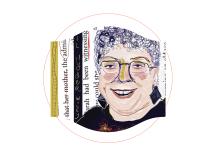
Bio: Gail Hyder Wiley is the organizer of Charlottesville Gathers, a group in Charlottesville, Va., that has taught hundreds of people nonviolent active bystander tactics and encourages resistance against racism, especially resistance led by people of color.
What inspired Charlottesville Gathers to organize nonviolent active bystander training? I saw what was happening after the election—that people were getting assaulted and demeaned, and it was just turning into a dangerous place for people who are outside of the spectrum of white privilege. There were a lot of people in December 2016 talking about the resistance, but there didn’t seem to be much training going on. I was impressed by the stories of people who used church basements, during the civil rights movement, to teach people nonviolent civil disobedience. I thought, “Okay, I belong to a church that has this big library, and it sits idle some nights, so why don’t we use that and bring in people who can help the community learn how to grapple with what we’re dealing with.”
What acts of racism have occurred in Charlottesville since last summer? There has been a string of incidents of white supremacists targeting our community that hasn’t made the news: white supremacist stickers placed over the new road sign for “Heather Heyer Way,” an activist’s tires getting slashed, and countless more insults and threats. Our immigrant neighbors have been fearful as the policies of our current president have become apparent, and the violence of the white supremacists in our area has amplified that fear.
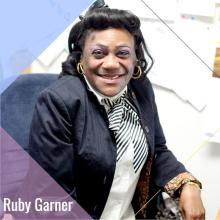
Ruby Garner is a health educator for Health People, an organization in New York’s South Bronx that provides services to people in need. She is an adviser to the AIDS Institute of the New York State Department of Health and partners with her church, First Corinthian Baptist in Manhattan, to provide medical care to its lower-income neighbors.
Website: healthpeople.org
1. What inspired you to partner with your church? Being able to give to my community, which has a lot of disparities, and deliver information and resources to people who need them is my passion. Working at Health People, I do presentations on behalf of the state of New York on diabetes prevention, health care for women, HIV, how to establish and maintain healthy relationships, and other topics. It made sense to take what I already do and bring it to my church.
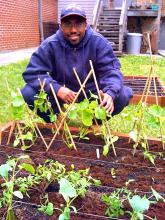
Bio: Rev. Heber Brown III is pastor of Pleasant Hope Baptist Church in Baltimore. Brown, Aleya Fraser, and Darriel Harris started the Black Church Food Security Network to connect black churches in food deserts with black farmers and urban growers.
Website: blackchurchfoodsecurity.net
1. How did the Black Church Food Security Network get started? As a result of the uprising [following the death of Freddie Gray], many corner stores in the most impoverished neighborhoods in Baltimore were put out of commission. It was an unjust arrangement to have entire neighborhoods dependent on corner stores for their food before the uprising, but the uprising intensified that already strained and unjust social arrangement.
Aleya [Fraser] started to call her farmer friends and food distributors—African-American grocers in Philadelphia and D.C.—and they started moving food to Baltimore. We transformed my church into a food depot and distribution center. We would process food donations from all over, and then we would pile the food in our church bus and I would drive the food around to those communities that needed food. We would set up shop on the corner and give out the food. We did that for nearly three weeks, and we realized that we had the beginnings of an alternative food system. The name came later; the action came first.
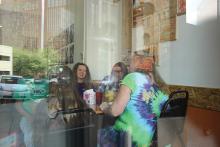
In 2011, Matt and Simone Weber co-founded Table Grace Cafe in Omaha, Neb.—a community lunch cafe staffed with volunteers who participate in a 10-day restaurant internship program. Simone is a Nashville-recorded singer-songwriter and Matt has culinary training from the Natural Gourmet Institute in New York. Together, the Webers spread a message of grace along with a cup of homemade soup and gourmet pizza.
Website: tablegracecafe.com
1. Why did you decide to incorporate a job assistance program?
Matt: I knew that we would be using volunteers off the street every day, since that’s one way people can get food—if they can volunteer. We were running into people who were in transition, from jail or homelessness, and could use that service. And because I have culinary training and education, it was easy for me to come up with this concept.
2. I hear you don’t have a cash register at the cafe.
Matt: That’s right. It’s a donation box instead of a cash register. We have no prices on our menu. We tell people what the food is worth, but we don’t require a certain amount. We believe that everybody is able to be generous no matter where they are in life. By allowing people to give a free-will donation, we’re meeting people where they are and inviting them to give what’s generous for them.
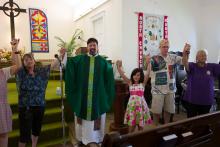
Rev. J. Barrett Lee is pastor of North Presbyterian Church in Kalamazoo, Mich., whose mission is to "practice our ministry alongside people who live with mental illness." Website: wearenorth.org
1. Why is it important to talk about mental illness? The only time people want to talk about mental illness as a broad social issue is when a mass shooting occurs. It’s a huge problem because it perpetuates the myths of what mental illness is and how people with mental illness operate. People think, “What if some mentally ill person gets a gun and is going to shoot up a church or a school?” But the reality is that people who live with mental illness are actually 10 times more likely to be victims of violence than perpetrators of violence. I don’t know a single person in my church who even owns a gun.
2. How is North Presbyterian’s call to ministry unique? We decided that our ministry with people living with mental illness was not going to be a side project. It wasn’t going to be something we did in addition to our ministry. We felt God calling us to reorient the entire life of our congregation around making a space where all people can be treated as equal partners in Christ’s service. We started the Togetherness Group, a weekly social activities group where the whole goal is to be together. We do lots of fun activities, whether that’s going out to lunch, going to the zoo, or just playing bingo on a rainy day. For a lot of folks, this is their one safe space each week when they can get out of the house, be treated like a human, embrace their own humanity, have a good time, and take some of the pressure off of daily living.

1. How would you describe Akilah Institute’s goals for its students and alumnae? Rwanda today is a far cry from the genocide-torn country that most think of when they hear about it. Rwandans have a vision of a knowledge-based economy, and Rwanda is fast becoming the region’s leader in information technology and new business development. And yet, only 1 percent of Rwandans attend university, and just 30 percent of these are women. We want to make sure that young women have a part to play in building the country’s future.
Akilah’s unique model of market-relevant education empowers young women to launch professional careers and assume leadership roles when they graduate. During their three years at Akilah, students develop English fluency, leadership, public speaking, and critical-thinking skills.
Bio: Senior pastor, Evergreen Baptist Church of Los Angeles.
Web site: www.ebcla.org